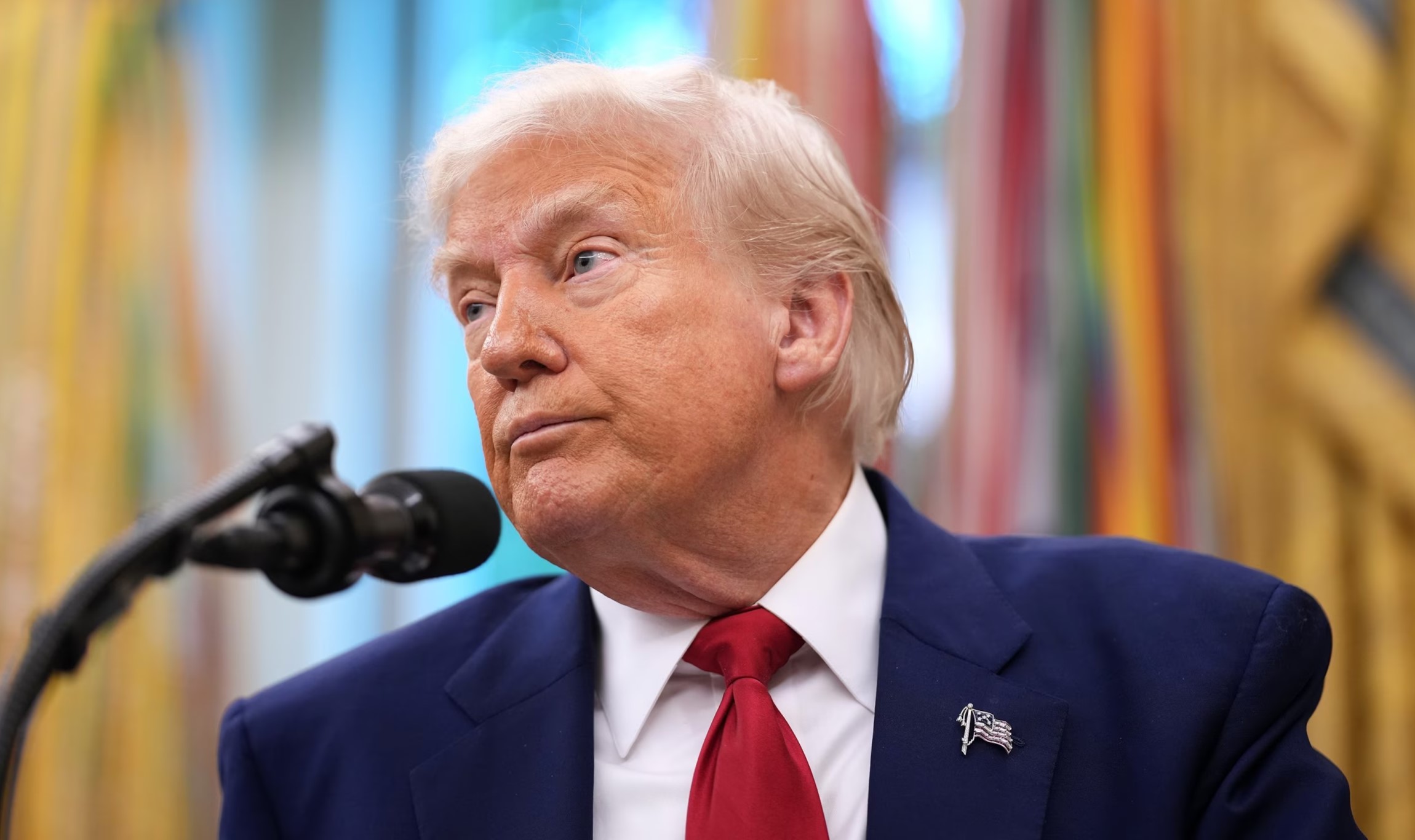There are moments in political history that leave the public stunned — not because of policies or scandals, but because of the sheer unpredictability of what just unfolded. One such moment occurred when a leader, known for upending tradition and defying expectations, shared something so provocative, so unfounded, that it left Americans and political observers worldwide wondering: how did we get here?
A post appeared on social media — not from an anonymous corner of the internet, but from the profile of a sitting president. It echoed a conspiracy so outlandish that it once would have been confined to internet fringe forums. But this time, it reached nearly 10 million followers instantly.
The ripple effect was immediate. And the outrage? Swift, loud, and global.
An Unthinkable Suggestion, Made Public
The message originated from a pro-leader social media account, known for its inflammatory content and far-right leanings. The post claimed, in no uncertain terms, that one of the most recognizable faces in modern American politics — President Joe Biden — was no longer alive.
“There is no #JoeBiden — executed in 2020,” the post read.
But the bizarre theory didn’t stop there. It went on to allege that what Americans had been seeing over the last several years were not human beings at all, but “robotic engineered soulless mindless entities.” According to this conspiracy, these entities were being used to impersonate the president and mislead the public.
“#Biden clones doubles & robotic engineered soulless mindless entities are what you see,” the post continued. “#Democrats don’t know the difference.”
To the disbelief of many, the post wasn’t merely ignored or dismissed. It was shared — by none other than Donald Trump himself.

Donald Trump has been slammed for sharing a bizarre conspiracy theory about Joe Biden (ALLISON ROBBERT / Contributor / Getty Images)
The Power of the Platform
The former president turned tech entrepreneur launched his own social media platform, Truth Social, in 2022, following bans from Twitter and Facebook. Since then, it has served as a personal megaphone for his opinions, endorsements, and grievances.
On June 1, 2025, Trump used that platform to amplify the above message — broadcasting it to his vast audience without context, disclaimer, or denouncement.
Critics were quick to respond, with one user summing up the national mood in a single sentence:
“Think about how low our political system has become — the president once again posts QAnon nonsense.”
The comments came pouring in. Many expressed frustration, embarrassment, and even fear over the normalization of fringe conspiracies in mainstream politics.
A Pattern of Disinformation
This wasn’t the first time Trump had been accused of promoting false or misleading information. His political rise has been accompanied by a long trail of unverified claims — some of which have had far-reaching consequences.
From the birtherism campaign against former President Barack Obama to claims of a “rigged” 2020 election, Trump has a history of embracing narratives that lack evidence but stir strong emotions.
Each time, his supporters argue he’s simply questioning the status quo. His critics, however, see a dangerous pattern of weaponized disinformation.
But even among his history of controversy, this latest episode stood out.
Crossing a New Line
Suggesting — even implicitly — that a former president was executed and replaced by clones wasn’t just bizarre. It crossed into dystopian fiction. And yet, it was shared by someone occupying the highest office in the land.
Political commentators scrambled to make sense of the move. Some called it a tactic — a way to distract from ongoing legal issues or declining approval ratings. Others saw it as a sign of deeper radicalization within certain parts of the political base.
Still, others were simply stunned into silence.
“Your President, America,” one user wrote.
“I really don’t see how we come back from this,” added another.
“Jesus wept…” was another particularly grim reply.
The Conspiracy’s Origins
The theory Trump shared is part of a wider and older narrative associated with the QAnon movement — a loose-knit online community built around anonymous claims that a secret cabal of elites controls world events.
Over the years, QAnon believers have promoted the idea that public figures, including politicians, celebrities, and tech executives, have been replaced by “doubles,” “clones,” or “deep fakes.” The idea, though scientifically and logically baseless, has found a home in certain digital communities.
By reposting this particular claim, Trump appeared to give credence to one of the most extreme branches of that movement — whether intentionally or not.
A Nation Reacts
In the hours and days following the repost, mainstream news outlets and political analysts weighed in. While some shrugged it off as typical Trump provocation, others worried about the implications.
Former government officials, including members of previous administrations, warned that such actions undermine public trust in institutions — especially during a time of deep political division.
“This is Presidential behavior now,” one observer tweeted. “Remember when this would have ended someone’s political career?”
Others echoed the concern, noting that while conspiracy theories had always existed on the fringes of society, never before had they been promoted by someone with such political and cultural influence.
Context: Biden’s Health Announcement
Adding to the tension was the timing of the post.
Just two weeks earlier, President Joe Biden’s office announced that he had been diagnosed with a serious form of cancer. According to the official statement released on May 18, Biden was undergoing evaluation for prostate cancer, marked by a high Gleason score of 9 — an indicator of aggressive disease, already showing signs of bone metastasis.
While the diagnosis was framed with cautious optimism — doctors indicated the cancer was hormone-sensitive and potentially manageable — it nonetheless reignited questions about Biden’s health and his ability to serve.
The cloning conspiracy, though patently false, appeared to feed off those public concerns. Critics accused Trump of exploiting a serious health issue for attention or mockery.
“It’s beyond tasteless,” one media personality commented. “This is where we are now? Laughing about clones while a man battles cancer?”
Medical Reality vs. Manufactured Fantasy
Medical experts swiftly condemned the spread of misinformation. On cable news segments and social media platforms, oncologists and public health officials stressed that serious illness should not be politicized — and certainly not twisted into outlandish narratives.
“It’s irresponsible, unethical, and deeply harmful,” said one cancer researcher. “There are families watching this who are dealing with their own battles. Turning a diagnosis into internet theater helps no one.”
Others pointed to the real consequences of conspiracy theory normalization — from declining trust in doctors and scientists to the rise in violent rhetoric aimed at public officials.
Calls for Accountability
Despite the backlash, there has been no public retraction or clarification from the president. The post remains up. For some, this silence was the loudest part of the story.
Advocacy groups, journalists, and citizens alike have called for platforms like Truth Social to include disclaimers on posts that contain known falsehoods — especially when shared by public officials.
Some lawmakers even floated the idea of reintroducing content moderation laws aimed at curbing political misinformation. While such measures face significant opposition, particularly from free speech advocates, the calls are growing louder.
“We’re not talking about opinion anymore,” said one law professor. “We’re talking about people in power promoting fabrications that damage the social fabric.”
Supporters Double Down
Still, not everyone condemned the post.
Within Trump’s base, some defended it as “satire,” “harmless curiosity,” or “a joke to trigger the media.” Others doubled down, claiming that mainstream journalists were ignoring “real questions” about Biden’s health and substituting critique with censorship.
In pro-Trump forums, users praised the repost for “exposing” a cover-up and “challenging the lies.” These online echo chambers reinforced the idea that questioning even the most absurd claims was a form of weakness.
This reflects a larger trend: the growing divide between shared facts and personalized truths.
Where Does This Leave the Country?
In a time when the line between truth and fiction is increasingly blurred, incidents like this one expose how fragile that line has become. When conspiracy theories are no longer fringe, but part of presidential communication, what does that say about the nation’s collective psyche?
For some, this is a call to action — a reminder that vigilance, media literacy, and accountability are more important than ever. For others, it’s a signal of how far the political culture has drifted from reality.
As America looks ahead to the next election cycle, questions about truth, responsibility, and leadership remain front and center.
Conclusion: The Impact of Words at the Top
Words from a president carry weight — perhaps more so in the digital age than ever before. When those words amplify fiction rather than facts, the consequences echo far beyond social media.
What began as a fringe theory ended up on the profile of a world leader. And while some dismissed it as “just another post,” many others saw it as the latest sign of a political reality that no longer resembles what came before.
In an age of clone conspiracies and political performance, Americans must ask: who do we trust, and what do we believe?
Because in today’s information war, every repost is a statement — and every silence, a message.

